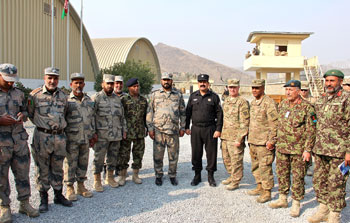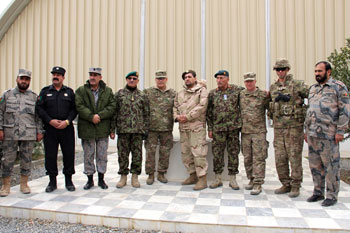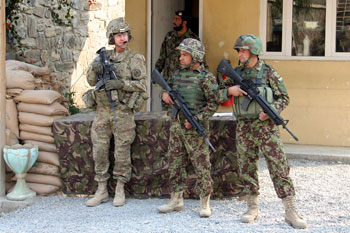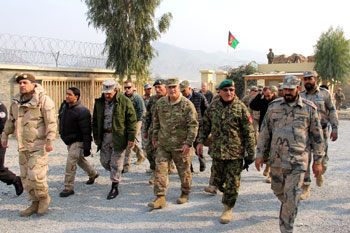INDIAN ARMED FORCES CHIEFS ON
OUR RELENTLESS AND FOCUSED PUBLISHING EFFORTS

SP Guide Publications puts forth a well compiled articulation of issues, pursuits and accomplishments of the Indian Army, over the years

I am confident that SP Guide Publications would continue to inform, inspire and influence.

My compliments to SP Guide Publications for informative and credible reportage on contemporary aerospace issues over the past six decades.
- Interim Defence Budget 2024-25 — An Analysis
- Union Defence budget 2024
- Indian Army: In quest of greater firepower and policy recommendations for gaps
- Indian Army Annual Press Conference 2024
- 6G will transform military-industrial applications
- Tata Boeing Aerospace Delivers 250 AH-64 Apache Fuselages, Manufactured in India
Crucial to India, US-Afganistan meet at Khyber
By SP's Special CorrespondentPhoto Credit: US Army







The meeting took place at the Khyber Border Coordination Center near Torkham Gate at the Afghanistan-Pakistan border, on Jan 4, where Resolute Support Commander Gen. John Campbell received an update from Afghan security forces. While India's engagement with CENTCOM hasn't achieved the same level of fruition as it has with PACOM, the current US-Afghanistan-Pak engagement is crucial to Indian national security and sovereignty, especially since groups like Al Qaeda and the Tehrik-e-Taliban Pakistan (TTP) have specific hostile plans aimed at India.
In the joint statement by Prime Minister Modi and President Obama on Jan 25, in fact, both sides includes a paragraph specifically on Afghanistan: " The President and the Prime Minister also stressed the importance of the economic and transport connectivity between Central and South Asia and the need to promote a secure, stable, and prosperous Afghanistan as part of a secure, stable, and prosperous region. Reaffirming the importance of their strategic partnerships with Afghanistan, the Leaders asserted the importance of a sustainable, inclusive, sovereign, and democratic political order in Afghanistan and they agreed to convene further high-level consultations on Afghanistan in the near future," while at the same time making a specific mention of Pakistan-based terror.
The joint statement included the following paragraphs that detail this crucial component to the strategic agreement over the next 10 years: "The Leaders committed to undertake efforts to make the U.S.-India partnership a defining counterterrorism relationship for the 21st Century by deepening collaboration to combat the full spectrum of terrorist threats and keep their respective homelands and citizens safe from attacks. The Leaders reiterated their strong condemnation of terrorism in all its forms and manifestations with 'zero tolerance' and reaffirmed their deep concern over the continued threat posed by transnational terrorism including by groups like Al Qaida and the ISIL, and called for eliminating terrorist safe havens and infrastructure, disrupting terrorist networks and their financing, and stopping cross-border movement of terrorists. The Leaders reaffirmed the need for joint and concerted efforts to disrupt entities such as Lashkar-e-Tayyiba, Jaish-e-Mohammad, D Company and the Haqqani Network, and agreed to continue ongoing efforts through the Homeland Security Dialogue as well as the next round of the U.S.-India Joint Working Group on Counter Terrorism in late 2015 to develop actionable elements of bilateral engagement. The two sides noted the recent U.S. sanctions against three D Company affiliates. The President and the Prime Minister further agreed to continue to work toward an agreement to share information on known and suspected terrorists. They also agreed to enter discussions to deepen collaboration on UN terrorist designations, and reiterated their call for Pakistan to bring the perpetrators of the November 2008 terrorist attack in Mumbai to justice."
In this light, engagements of the kind that took place at the Khyber border post in January will have a direct overall bearing on the security situation not just there, but also when dovetailed with Pak military action against the TTP and other groups, as well as the current security situation on the Eastern border.





